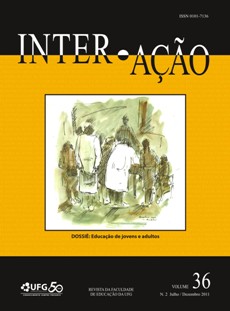DILEMAS CONTEMPORÂNEOS NA GRADUAÇÃO BRASILEIRA: DIRETRIZES CURRICULARES NACIONAIS (DCN’S), UM ESTUDO SOBRE O DOCUMENTO
DOI :
https://doi.org/10.5216/ia.v36i2.16725Résumé
O presente artigo tem por objetivo analisar um documento oficial do sistema educacional brasileiro, as Diretrizes Curriculares Nacionais (DCN), apresentando como escopo de investigação a elaboração de um paralelo entre as Diretrizes e o contexto contemporâneo do mundo neoliberal/globalizado, a partir da leitura do corpo de texto do documento. Isto é, averiguar os dilemas, as contradições e convergências entre as Diretrizes (criadas para nortear o sistema educacional da graduação brasileira) e os pressupostos políticos, econômicos, educacionais e culturais do modelo neoliberal de sociedade. Para tanto, apoia-se nesse texto em noções capitais para o empreendimento de tal análise, tais como globalização, ideologia, currículo, poder etc.Téléchargements
Téléchargements
Publié-e
Comment citer
Numéro
Rubrique
Licence
A Inter-Ação utiliza como base para transferência de direitos a licença Creative Commons Attribution 4.0 para periódicos de acesso aberto (Open Archives Iniciative - OAI). Por acesso aberto entende-se a disponibilização gratuita na Internet, para que os usuários possam ler, baixar, copiar, distribuir, imprimir, pesquisar ou referenciar o texto integral dos documentos, processá-los para indexação, utilizá-los como dados de entrada de programas para softwares, ou usá-los para qualquer outro propósito legal, sem barreira financeira, legal ou técnica.
Autores que publicam neste periódico concordam com os seguintes termos:
1) Autores mantém os direitos autorais e concedem à revista o direito de primeira publicação, com o trabalho simultaneamente licenciado sob a Licença Creative Commons Attribution que permite o compartilhamento do trabalho com reconhecimento da autoria e publicação inicial nesta revista.
2) Autores têm autorização para assumir contratos adicionais separadamente, para distribuição não-exclusiva da versão do trabalho publicada nesta revista (ex.: publicar em repositório institucional ou como capítulo de livro), com reconhecimento de autoria e publicação inicial nesta revista.
3) Autores têm permissão e são estimulados a publicar e distribuir seu trabalho online (ex.: em repositórios institucionais ou na sua página pessoal) a qualquer ponto antes ou durante o processo editorial, já que isso pode gerar alterações produtivas, bem como aumentar o impacto e a citação do trabalho publicado.















